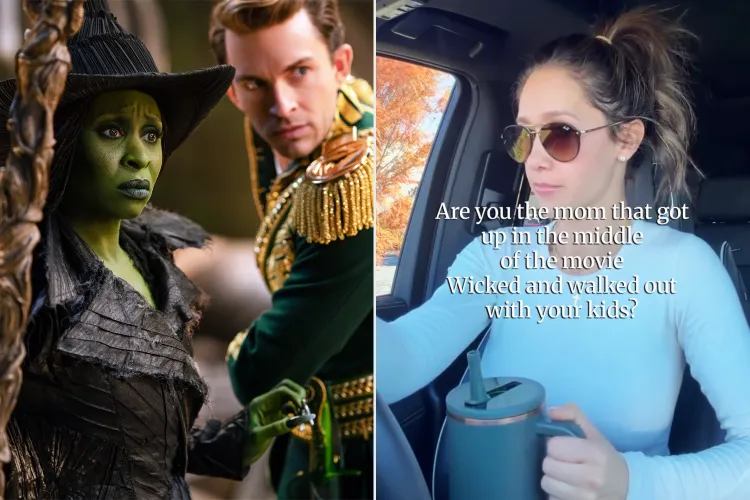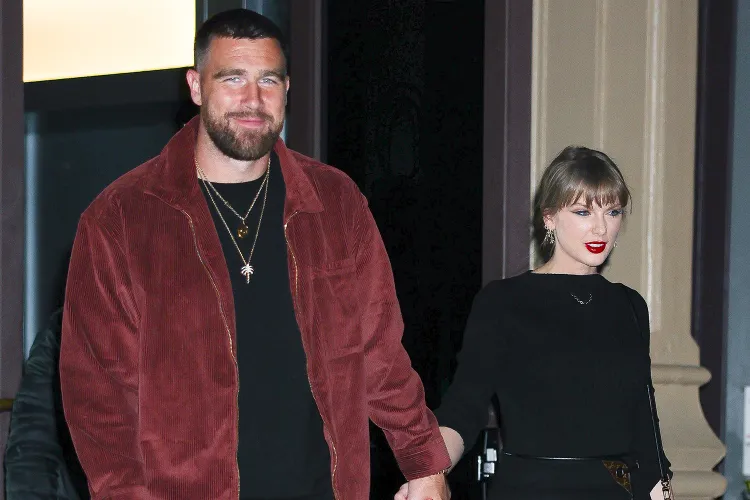Influencer Finally Breaks Her Silence After Backlash for Leaving Wicked: For Good Mid-Movie — What Really Happened Inside the Theater
The conversation around Wicked: For Good has dominated social media since the film’s release, but few reactions have sparked as much debate as the one shared by a momfluencer who walked out of a screening with her children halfway through the movie. What started as a personal parenting decision quickly spiraled into a viral discussion about expectations, content warnings, and the culture of online judgment that surrounds family influencers. Now, after days of speculation, comments, and criticism, she is speaking up to explain exactly what happened — and why she made the choice she did.
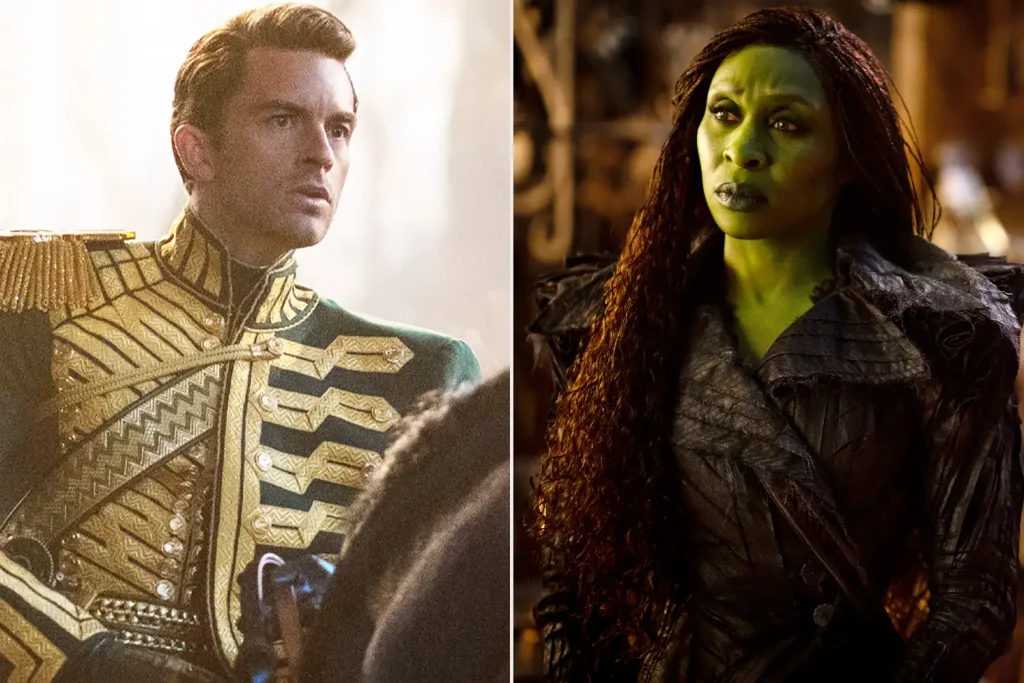
The mom, known online as Sincerely, SaraB, posted a short video on Instagram responding to a follower who asked, “Are you the mom that got up in the middle of the movie Wicked and walked out with your kids?” Instead of ignoring the message, she answered it directly from the front seat of her car, wearing sunglasses and looking equal parts composed and weary — a combination anyone who has ever been the center of sudden internet scrutiny would recognize. Her calm demeanor didn’t hide the exhaustion in her voice as she confirmed that, yes, she was that mom, and yes, she stood by her decision.
Her video didn’t offer dramatics. She didn’t frame herself as a victim or a martyr. Instead, she emphasized something every parent understands intuitively: doing what feels right in the moment for your children. According to her, she left the theater because certain scenes felt “too intense” for her young kids, and she wasn’t comfortable keeping them in the room when they seemed overwhelmed. She didn’t criticize the film itself. She didn’t blame the actors or the story. Her issue was solely about age appropriateness and a parent’s instinct to protect.
But the internet, in predictable fashion, divided into two camps almost immediately.
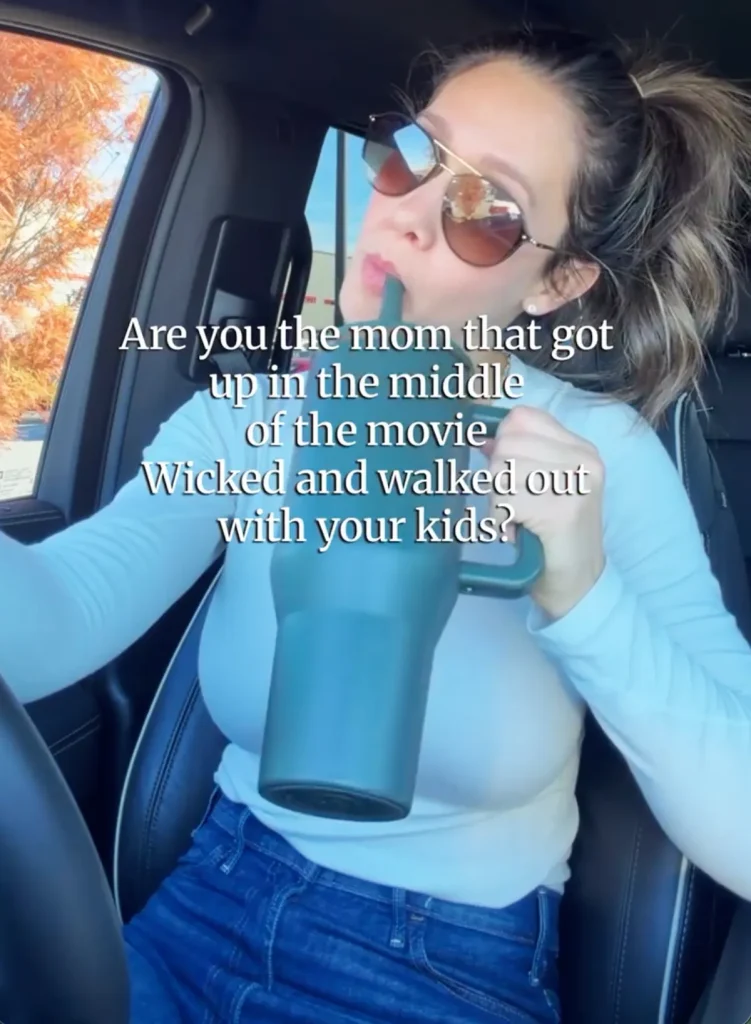
Some viewers applauded her openness. They said it was refreshing to see a parent set boundaries, even if it meant missing a long-awaited movie. Others argued that Wicked: For Good — a film adaptation of the massively popular Broadway musical — had been widely promoted with visuals, trailers, and themes that made it clear it included darker emotional beats. To them, leaving halfway through suggested a lack of preparation rather than a surprising shift in tone.
Those conversations soon moved beyond the content of the film itself and into the broader, more complicated world of parenting in the spotlight. Influencers who share their daily lives online often find themselves at the intersection of vulnerability and public critique, and on this issue, the debate quickly evolved into something larger than a single movie experience.
In her follow-up comments, Sara explained that her children had been excited to see the film — and so had she. Wicked has been a cultural phenomenon for nearly two decades, beloved for its themes of courage, individuality, and the complicated nature of good versus evil. But those same themes come with tonal depth, emotional intensity, and scenes that lean into fear, conflict, and moral struggle. For adults, those moments feel artistic and powerful. For younger children, they can feel frightening and unfamiliar.
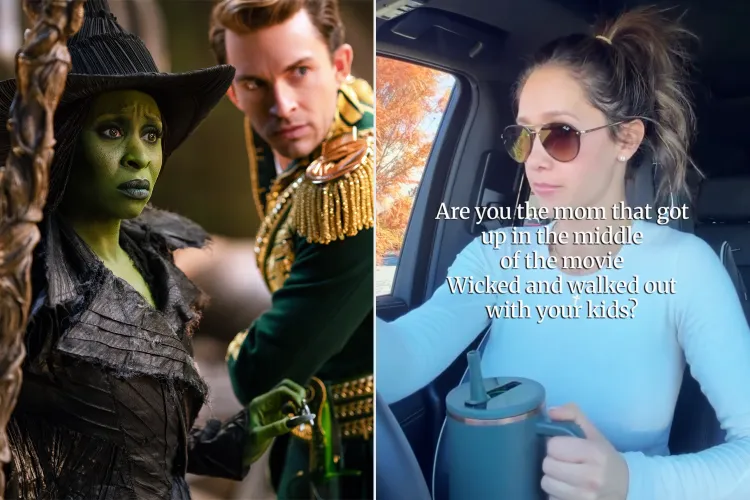
For Sara, the turning point came when she noticed her kids shifting uncomfortably in their seats. She didn’t specify the exact scene — she simply said it “didn’t feel right.” For parents, making the call in the moment is often instinctive, an unspoken agreement with oneself that your child’s emotional reaction matters more than your own enjoyment of the show. She gathered their things, stood up quietly, and walked them out, assuming that was the end of it.
But a fellow moviegoer recognized her, posted a comment online afterwards, and the story began to spread — first among local theater visitors, then across social media, eventually landing on platforms where audiences treat influencer behavior like a public referendum. Before long, people who had never heard of her suddenly had strong opinions about her parenting choices.
When she finally addressed the situation publicly, she did so not with defensiveness but with clarity. She reiterated that parents make judgment calls every day, and while hers happened to occur in a movie theater during a major film release, it wasn’t fundamentally different from decisions parents make in parks, restaurants, or even their own homes. She acknowledged that some people might have made a different choice — and she was fine with that. What mattered to her was that her children felt safe, respected, and heard.
As the online debate grew, the film itself continued drawing viewers. Wicked: For Good, adapted from the Broadway hit starring Cynthia Erivo as Elphaba and Ariana Grande as Glinda, has been consistently praised for its world-building, breathtaking visuals, and emotional weight. Director Jon M. Chu crafted a universe that balances whimsy with theatrical darkness, staying true to the stage production’s tone. But like many fantasy films, it includes moments that push beyond the softness of children’s movies. For adults, those scenes deepen the story. For very young viewers, they can feel intense.
Experts in child psychology often remind parents that movie ratings are guidelines, not guarantees. A PG rating suggests parental guidance may be necessary — not just for violence or fear, but also for themes and emotional complexity. Every child reacts differently, and parents know best when their kids are overstimulated or uncomfortable. Because of this, Sara’s experience highlights an ongoing challenge for families navigating modern entertainment: the gap between what looks magical in a trailer and what feels overwhelming in full-story context.
What struck most viewers about Sara’s response wasn’t the fact that she left the theater — it was the vulnerability in her voice when she explained why she felt the need to address it at all. Being an influencer means that even small choices can become magnified, and ordinary parenting moments become internet talking points. She mentioned that she never expected the story to gain traction, and she hoped other parents wouldn’t feel alienated or judged for prioritizing their children’s emotional comfort.
She also addressed the messaging she received privately. Some people reached out to thank her for bringing attention to the film’s intensity for younger children. Others criticized her for “overreacting” or not researching the musical beforehand. She responded to both groups with the same simple truth: she did what she thought was right, and she would do it again.
The situation shines light on a larger cultural conversation about movie expectations, the pressure placed on parents, and the scrutiny influencers face in an era where every decision can become public commentary. Parents today navigate an environment where choices are constantly observed, compared, and sometimes attacked, especially for those who build their careers online. Sara’s situation shows how quickly a private moment becomes a public debate — and how important it is for influencers to hold onto their authenticity even when facing backlash.
Her explanation did more than defend a decision. It reminded her audience that motherhood is messy and unpredictable. It reminded parents that walking out of a movie with your kids doesn’t mean you disapprove of the film; it simply means you know your children well enough to see when something isn’t working. And it reminded everyone watching the situation unfold that judgment on the internet often lacks context, empathy, or respect for nuance.
As the discourse around Wicked: For Good evolves, Sara seems ready to step back and let the film stand on its own. She didn’t attack the movie or discourage others from seeing it. She simply told her story and moved on, choosing to focus on her kids rather than online criticism. The experience may have opened up uncomfortable conversations, but it also gave her a chance to reaffirm her parenting philosophy: protect your children first, explain yourself later if you must.
In the end, the episode became more about the nature of digital culture than about the movie itself. It showed how quickly narratives can spiral, how easily strangers feel entitled to offer judgments, and how often influencers are expected to justify ordinary decisions. But it also showed the strength that comes from speaking openly, owning one’s actions, and refusing to let backlash reshape a moment built on parental instinct.
For Sara, the moment in the theater was simple. Her children were overwhelmed. She did what she believed was right. And in a world that demands constant explanations, she offered one with grace.
